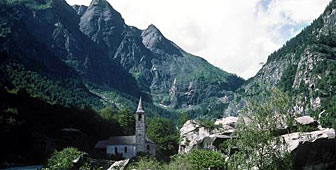Small victory for nature conservation

The environmental organisation, Pro Natura, is financing feasibility studies for three alpine areas vying to become Switzerland's second national park. The successful project will help protect biodiversity and be a boost for eco-tourism.
The attempt to set up a second national park is a bold move by Pro Natura. It comes after communities living close to the existing Swiss National Park in eastern Switzerland voted against further expansion plans.
Even though the Swiss National Park was the first of its kind in Europe when it was set up in 1914, expansion has been modest, and larger and more numerous parks in neighbouring countries have taken away much of its appeal.
Pro Natura says it will put forward SFr1 million towards the creation of a new Swiss national park, but acknowledges that any new project needs support at grassroots level.
“I think the secret to success is to ensure inclusion of the local population in any decision-making process,” says Otto Sieber, head of Pro Natura. “It’s no longer possible for the government or private organisations to take unilateral decisions when it comes to setting up protected areas.”
Pro Natura started its campaign by sending letters to every community in the country to gauge the level of interest. It received about 90 positive responses and has narrowed the field to three front-runners and a dozen others with potential.
Feasibility studies will now be carried out in the three leading areas: the high-alpine Val de Bagnes in canton Valais, Adula/Rheinwaldhorn in south-eastern Switzerland, which includes examples of both central and southern alpine flora and fauna, and canton Ticino’s Vallemaggia with its narrow valleys and high cliffs.
Pro Natura says it will announce the winning candidate in a year’s time, and hopes the new park will come into existence by the end of the decade. A new park will help ease criticism that Switzerland isn’t doing enough to live up to its international commitments to protect biodiversity.
Sieber also believes it will provide a boost for eco-tourism in Switzerland. “Tourists are attracted to nature reserves,” he says. “Whether a country has protected areas that are accessible is often a deciding factor when they choose a place to go on holiday.”
The label “national park” would undoubtedly bring the natural wonders of the three leading areas to the attention of a wider public.
Impressive glaciers and 4,000 metre high peaks of the Massiv des Grand Combin dominate the Val de Bagnes. This is the highest place in Switzerland where flora dependent on moist soils are found. It’s also home to large wildlife populations, including ibex and chamois. Around 150 of the area’s 200 square kilometres are already protected as a nature reserve.
The Vallemaggia project encompasses a 340 square kilometre alpine region and several valleys. It enjoys a microclimate, affected by precipitation from the north and warm winds from the Mediterranean. The mixed forests climbing the mountainsides count oak, ash, chestnut, cherry, lime and pine trees.
There’s as much diversity further east in Adula/Rheinwaldhorn, which is almost twice the size as the Vallemaggia area. Its landscape is marked by arve and chestnut forests, moors as well as sedimentary rock and glacial relics. It’s also the source of the Rhine River.
“Switzerland has a very complex geography. It has northern Alps which are very different from the western or southern Alps. It has the Jura mountains,” Sieber explains.
“There’s great biodiversity in the country because we have both a northern and southern European climate, and flora and fauna. We also have influences from the east and the west. It’s a crossroads where the different influences come together.”
by Dale Bechtel

In compliance with the JTI standards
More: SWI swissinfo.ch certified by the Journalism Trust Initiative

You can find an overview of ongoing debates with our journalists here. Please join us!
If you want to start a conversation about a topic raised in this article or want to report factual errors, email us at english@swissinfo.ch.